Paris Center Stories: Maxime Riché, photographer
Maxime Riché (SEAS '05) presented his Climate Heroes project at the Paris Center and did a TedTalk looking for people and answers dealing with a changing climate.

What is your connection to Columbia?
I am a graduate of the MS in Biomedical Engineering (2005).
What is Climate Heroes and how did the project begin?
Climate Heroes is a documentary and advocacy media project about climate change gathering photos, videos, and texts with a science educational component. It was created in 2010 after I realized the urgency of talking about climate change, during COP15 in Copenhagen. Soon after I was joined by a team of photographers that I approached and asked if they would join me telling those stories.
Over a six-year period, the Climate Heroes team documented the stories of those women and men who work, every day around the world, in order to mitigate climate change, understand its consequences and allow us to be better prepared to adapt to it. Citizens, activists, scientists, or entrepreneurs, the Climate Heroes prepare our world as it will be tomorrow. By their positive example, they can inspire the great many to start acting now to mitigate climate change.
Published in a special 15-page dossier in Geo Magazine in December 2015, and exhibited to the public at the Grand Palais, the project was awarded the «COP21, Paris 2015» label by Mrs Ségolène Royal, French Minister for Sustainable Development, and the Secretary General of COP21.
Did working on the project make you feel optimistic for the future of our planet?
It made me optimistic on some aspects like in our ability to invent solutions and share inspiration. The inspirational power of those women and men is what stuck with me most.
Today, it is very easy to yield to pessimism and give up hope. This project, by allowing me to learn at an intellectual level those solutions, also made me realize that this won't be enough: we need to move to a more emotional, community-oriented and compassionate way to talk about the subject if we want people to feel how they can take part.
What role can art, photography in particular, play in translating the urgency of our climate crisis to the public and to our elected leaders?
Scientists have studied issues related to our environment and climate for decades, and they too face the same challenge when it comes to showing it to the public in a way that compels us, and is inspiring.
This is the power of art and photography in showing us, emotionally how to understand this problem on another level. As Einstein once said, “No problem can be solved from the same level of consciousness that created it.” Art and photography in particular, by being anchored in the reality of the world around us, have this power of showing, suggesting, while still accommodating enough of the emotional to appeal to our subconscious, make us not only understand but also feel. This second step of feeling is the prerequisite to action.
In your TEDx talk you spoke about the importance of storytelling. Why is it essential to put a human face on the reality of climate change?
We cannot relate to figures and facts that are, in addition, remote from us. I believe the human faces are essential to convey those messages and allow us to identify, feel empathy, and find ideas and inspiration from other people who have already lived through those situations.
What are you working on now?
In my next project, Worldkeepers, I explore how we can keep a balance in the way that we live on Earth, our planet, and how to also stay healthy, human, compassionate, and stop destroying our home.
This is an artistic documentary which projects us into the future through the portraits of the "Sentinels" a group of women and men who advocate vigilance and a balanced approach to development, in order to protect our planet and our societies.
With my team, we use the concept of futuristic archaeology in order to reveal their portraits and the content of their testimonials as if they were seen by a public 100 years from now: imagine you find a time capsule in which people have encapsulated their warnings and thoughts about the main issues that can make Man disappear.
As in a science fiction movie, imagine you’re listening to their videos and you see photos of this world that no longer exists. My question for you is: what are you going to do today so that we keep a balance in our development and ensure our species' survival on this planet?